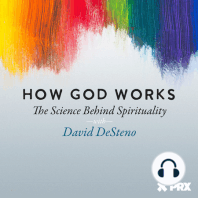35 min listen
How to Forgive
ratings:
Length:
33 minutes
Released:
Dec 11, 2022
Format:
Podcast episode
Description
‘Tis the season for giving and…forgiving. But while forgiveness is something to which we often aspire, it can be harder than it seems at times. It's human to feel the tension between the urge for revenge and the intent to forgive, especially when the hurt or betrayal is great. That tension shows up in many religions too, though forgiveness usually wins. But it’s not just a religious ideal, it’s also a biological necessity.
We’ll talk to evolutionary psychologist Michael McCullough about the evolutionary case for forgiveness and why it’s a show of strength, not weakness. And theologian Miroslav Volf about the Christian foundation for forgiveness, and the tools religion can offer when forgiveness feels impossible.
Michael McCullough is a Professor of Psychology at UC San Diego. He is author of the book Beyond Revenge: The Evolution of the Forgiveness Instinct. Find out more about his work on his website.
Professor Miroslav Volf is founder and director of the Yale Center for Faith & Culture. Read his book, Free of Charge: Giving and Forgiving in a Culture Stripped of Grace, and listen to the Center’s podcast For the Life of the World.
We’ll talk to evolutionary psychologist Michael McCullough about the evolutionary case for forgiveness and why it’s a show of strength, not weakness. And theologian Miroslav Volf about the Christian foundation for forgiveness, and the tools religion can offer when forgiveness feels impossible.
Michael McCullough is a Professor of Psychology at UC San Diego. He is author of the book Beyond Revenge: The Evolution of the Forgiveness Instinct. Find out more about his work on his website.
Professor Miroslav Volf is founder and director of the Yale Center for Faith & Culture. Read his book, Free of Charge: Giving and Forgiving in a Culture Stripped of Grace, and listen to the Center’s podcast For the Life of the World.
Released:
Dec 11, 2022
Format:
Podcast episode
Titles in the series (58)
Contemplating Death: A Secret for Happiness: COVID-19 has led to what’s being called The Great Resignation. People are leaving their jobs in record numbers, many to find more meaning in life or to spend more time with family and friends. As it turns out, realizing that death might not be as far off as it usually seems just might have something to do with that. by How God Works: The Science Behind Spirituality
